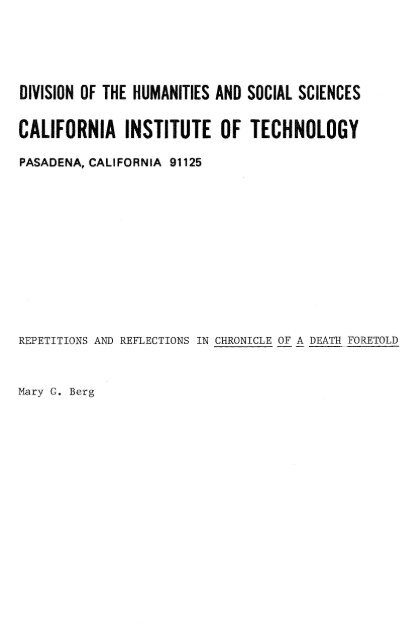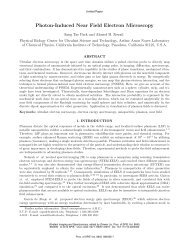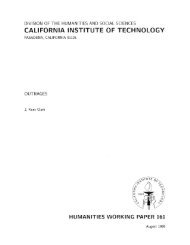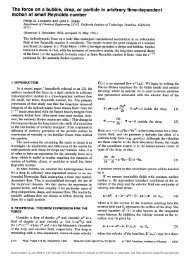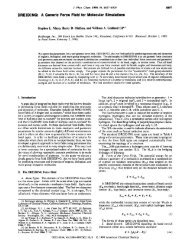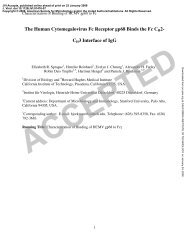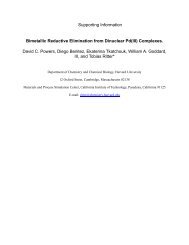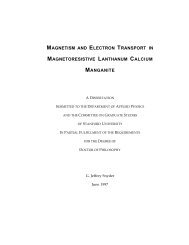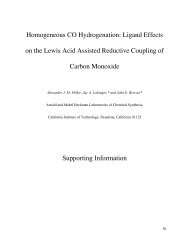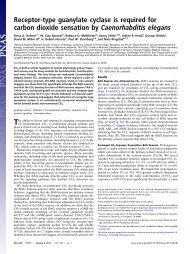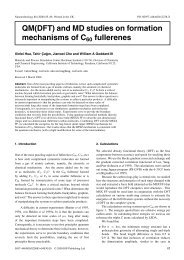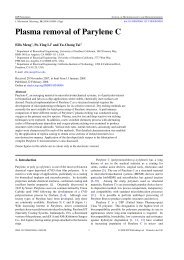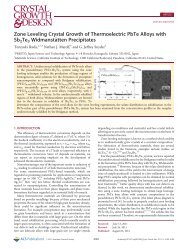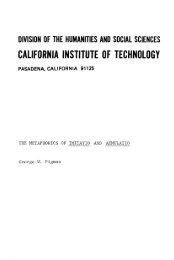Repetitions and reflections in Chronicle of a Death Foretold
Repetitions and reflections in Chronicle of a Death Foretold
Repetitions and reflections in Chronicle of a Death Foretold
Create successful ePaper yourself
Turn your PDF publications into a flip-book with our unique Google optimized e-Paper software.
DIVISION OF THE HUMANITIES AND SOCIAL SCIENCES<br />
CALIFORNIA INSTITUTE OF TECHNOLOGY<br />
PASADENA, CALIFORNIA 91125<br />
REPETITIONS AND REFLECTIONS IN CHRONICLE OF A DEATH FORETOLD<br />
Mary G. Berg
HUMANITIES WORKING PAPER 110<br />
© Mary G. Berg September 1984
time (5:30) when this first <strong>of</strong> a series <strong>of</strong> overlayered accounts beg<strong>in</strong>s<br />
(rem<strong>in</strong>d<strong>in</strong>g us that this is a chronicle, a chronology <strong>of</strong> events). Oddly,<br />
however, the unadorned certa<strong>in</strong>ty <strong>of</strong> the murder, although given<br />
precedence <strong>of</strong> place <strong>in</strong> the sentence, is presented <strong>in</strong> a subord<strong>in</strong>ate<br />
clause as though it were a casual reference, an ord<strong>in</strong>ary event to be<br />
presented matter-<strong>of</strong>-factly, an occurrence easily coupled with everyday<br />
actions. The story is be<strong>in</strong>g told <strong>in</strong> retrospect by a narrator who<br />
speaks from a time after the murder has taken place, by a narrator who<br />
allows the as yet unconsummated disaster to cast its om<strong>in</strong>ous shadow<br />
over the description that follows. We look for clues <strong>in</strong> the bishop's<br />
arrival <strong>and</strong> <strong>in</strong> the account <strong>of</strong> Nasar's dream. We seek a foreshadow<strong>in</strong>g<br />
<strong>of</strong> death <strong>in</strong> the description <strong>of</strong> the dream only to realize <strong>in</strong> the third<br />
sentence that the retrospective anxiety <strong>and</strong> eagerness to perceive<br />
premonition, emotions <strong>in</strong> which we have participated because <strong>of</strong> the way<br />
<strong>in</strong> which the story is told, are the emotions <strong>of</strong> Nasar's mother as she<br />
evokes memories <strong>of</strong> the past, as she tells the account <strong>of</strong> the dream the<br />
way she remembers it (or rather as the author has the narrator choose<br />
to describe her recollection <strong>of</strong> it). There is constant tension<br />
throughout <strong>Chronicle</strong> between what we expect <strong>and</strong> what we get, between<br />
proliferat<strong>in</strong>g separate images <strong>and</strong> a human desire to generalize.<br />
The book's first two sentences appear as objective third-person<br />
statements but <strong>in</strong> the third, objectivity is unmasked as the chatter <strong>of</strong><br />
Santiago Nasar's mother as she rem<strong>in</strong>isces to the narrator. Placida's<br />
remark also contrasts with the portentous tone <strong>of</strong> the dream<br />
description: her generalization comments upon <strong>and</strong> makes fun <strong>of</strong> the<br />
3
dream just as the <strong>Chronicle</strong> as a whole both takes seriously <strong>and</strong> makes<br />
fun <strong>of</strong> the genre <strong>of</strong> the murder mystery.<br />
The limitations <strong>of</strong> <strong>reflections</strong>.<br />
The dream description <strong>in</strong>cludes imagery <strong>of</strong> awaken<strong>in</strong>g from the<br />
damp vegetal happ<strong>in</strong>ess <strong>of</strong> tropical sleep to harsh morn<strong>in</strong>g light <strong>and</strong> the<br />
sweaty discomfort <strong>of</strong> a hangover (as we are told <strong>in</strong> the next paragraph).<br />
But it is an awaken<strong>in</strong>g <strong>in</strong>to a sensation which is more unreal, more<br />
literally untrue (bird shit) than the dream which may echo the ra<strong>in</strong><br />
which we soon f<strong>in</strong>d out mayor may not have been fall<strong>in</strong>g on the morn<strong>in</strong>g<br />
<strong>of</strong> the murder. All through <strong>Chronicle</strong> we are presented with images which<br />
may be mirror <strong>reflections</strong>, as we seek underst<strong>and</strong><strong>in</strong>g <strong>of</strong> an event <strong>of</strong> 27<br />
years ago as it is reflected <strong>in</strong> the mirrors <strong>of</strong> memory. But we become<br />
<strong>in</strong>creas<strong>in</strong>gly aware that a mirror may be held <strong>and</strong> tipped <strong>in</strong> a countless<br />
number <strong>of</strong> ways to reflect different aspects <strong>and</strong> that although the<br />
<strong>reflections</strong> may give us glimpses they never convey a total picture; a<br />
reflection is by its nature superficial <strong>and</strong> limited <strong>and</strong> there is no use<br />
ask<strong>in</strong>g it to be more.<br />
The narrator's declared desire is to reassemble <strong>and</strong> comprehend<br />
the complete experience <strong>of</strong> the past by f<strong>in</strong>d<strong>in</strong>g all <strong>of</strong> the fragments<br />
"so many scattered shards" <strong>of</strong> "the broken mirror <strong>of</strong> memory" (p. 6).<br />
Thous<strong>and</strong>s <strong>of</strong> scattered bits are scrut<strong>in</strong>ized <strong>in</strong> the text but the<br />
coherent whole becomes more <strong>and</strong> more elusive. A fragment like Nasar's<br />
dream <strong>of</strong> trees <strong>and</strong> bird shit is presented, commented upon, set down<br />
aga<strong>in</strong>, picked up later <strong>in</strong> the text like an odd jigsaw puzzle piece that<br />
4
The narrator himself seems like a ghost to those who live <strong>in</strong> the past,<br />
to Pura Vicario <strong>and</strong> to Placida L<strong>in</strong>ero.<br />
No one <strong>in</strong> the town can believe the evidence <strong>of</strong> eyes <strong>and</strong> ears; when<br />
the Vicarios sharpen their knives <strong>and</strong> declare their <strong>in</strong>tention <strong>of</strong><br />
kill<strong>in</strong>g Santiago Nasar, "their reputation as good people was so well<br />
founded that no one paid any attention to them" (p. 52). When they<br />
tell Clotilde Armenta, "she couldn't believe she'd heard right" (p.<br />
54) <strong>and</strong> to Flora Miguel "it seemed <strong>in</strong>conceivable" (p. 112). For a<br />
great variety <strong>of</strong> reasons, no one can accept that reality should be so<br />
simple, motivations so direct, cause <strong>and</strong> effect so evidently l<strong>in</strong>ked.<br />
The novel is a chronicle <strong>of</strong> search for complexity, for concealed<br />
underly<strong>in</strong>g truths, for satisfy<strong>in</strong>g explanations <strong>of</strong> why events occur as<br />
they do. From beg<strong>in</strong>n<strong>in</strong>g to end, the search fails. Placida L<strong>in</strong>ero,<br />
still try<strong>in</strong>g to underst<strong>and</strong> her son's dream <strong>of</strong> 27 years before, accepts<br />
only the guilt she can bear: "she never forgave herself for hav<strong>in</strong>g<br />
mixed up the magnificent augury <strong>of</strong> trees with the unlucky one <strong>of</strong><br />
birds" (p. 98). When we encounter the dream <strong>in</strong> the book's second<br />
sentence <strong>and</strong> Placida's generaliz<strong>in</strong>g remark <strong>in</strong> the third, we do not yet<br />
know <strong>of</strong> her responsibility for her son's death (through the<br />
mis<strong>in</strong>terpretation <strong>of</strong> signs, through believ<strong>in</strong>g Div<strong>in</strong>a Flor's vision,<br />
through not see<strong>in</strong>g a complete or accurate picture from the w<strong>in</strong>dow,<br />
through mistak<strong>in</strong>g the orig<strong>in</strong> <strong>of</strong> sounds: a whole series <strong>of</strong> fatal<br />
misapprehensions) or that this is a woman whose life has stopped for<br />
twenty-seven years, <strong>and</strong> yet our first impressions <strong>of</strong> her are as valid<br />
as our last: more <strong>in</strong>formation does not make us wiser even on an<br />
7
<strong>in</strong>dividual, personal level.<br />
<strong>Repetitions</strong> <strong>and</strong> contradictions.<br />
Direct conversation alternates with the narrator's observations,<br />
which <strong>of</strong>ten qualify <strong>and</strong> modify the voices he records. As the book<br />
progresses, each new voice adds to our composite knowledge <strong>of</strong> the<br />
events <strong>of</strong> the day <strong>of</strong> the murder but it also revises <strong>and</strong> underm<strong>in</strong>es the<br />
<strong>in</strong>formation which has preceded it. The story <strong>of</strong> Santiago Nasar's<br />
morn<strong>in</strong>g is told over <strong>and</strong> over aga<strong>in</strong>, <strong>in</strong> a spiral <strong>of</strong> near repetitions.<br />
We circle around <strong>and</strong> around the central mysteries <strong>of</strong> the tale,<br />
listen<strong>in</strong>g to stories <strong>and</strong> contradictions, disagreements <strong>and</strong><br />
confirmations. Never are we allowed to escape the contradictory nature<br />
<strong>of</strong> <strong>in</strong>dividual testimony about facts. In the second paragraph, <strong>in</strong> the<br />
very first descriptions <strong>of</strong> Santiago Nasar's morn<strong>in</strong>g, hilarious<br />
contradiction dispells any <strong>in</strong>cl<strong>in</strong>ation we might have to believe<br />
witnesses literally. Everyone remembers Santiago Nasar as<br />
a little sleepy but <strong>in</strong> a good mood, <strong>and</strong> he remarked to all <strong>of</strong> them<br />
that it was a very beautiful day. No one was certa<strong>in</strong> if he was<br />
referr<strong>in</strong>g to the state <strong>of</strong> the weather. Many people co<strong>in</strong>cided <strong>in</strong><br />
recall<strong>in</strong>g that it was a radiant morn<strong>in</strong>g with a sea breeze com<strong>in</strong>g<br />
<strong>in</strong> through the banana groves .• But most agreed that the<br />
weather was funereal • • . <strong>and</strong> that at the moment <strong>of</strong> the<br />
misfortune a th<strong>in</strong> drizzle was fall<strong>in</strong>g like the one Santiago Nasar<br />
had seen <strong>in</strong> his dream grove. (p. 4)<br />
Angelo Vicario's memories <strong>of</strong> her relationship with Bayardo are<br />
8
<strong>and</strong> limitation is woven through the text. The physical images cycle<br />
through the text, mentioned <strong>and</strong> repeated, modified <strong>and</strong> f<strong>in</strong>ally<br />
<strong>in</strong>terconnected. The scene <strong>of</strong> the disembowell<strong>in</strong>g <strong>of</strong> the rabbits which<br />
so disgusts Santiago Nasar is f<strong>in</strong>ally l<strong>in</strong>ked to the parallel<br />
disembowell<strong>in</strong>g <strong>of</strong> Santiago Nasar himself. The church bells r<strong>in</strong>g over<br />
<strong>and</strong> over aga<strong>in</strong> <strong>and</strong> f<strong>in</strong>ally toll explicitly for the death <strong>of</strong> Santiago<br />
Nasar. The "baptistry smell" (p. 7) is mentioned aga<strong>in</strong> <strong>and</strong> aga<strong>in</strong><br />
<strong>and</strong> is the foul personal odor <strong>of</strong> Santiago Nasar as he dies. The note<br />
on the hall floor which people repeatedly fail to see is f<strong>in</strong>ally read.<br />
The image <strong>of</strong> Santiago Nasar carry<strong>in</strong>g red roses (p. 116) becomes the hideous<br />
f<strong>in</strong>al image <strong>of</strong> the murder victim hold<strong>in</strong>g his <strong>in</strong>test<strong>in</strong>es <strong>in</strong> his h<strong>and</strong>s.<br />
Memory.<br />
The narrator presents his own memory as a tabula rasa, scuffled<br />
over with vague <strong>and</strong> hazy recollections, which he wishes to fill with a<br />
coherent underst<strong>and</strong><strong>in</strong>g <strong>of</strong> what happened. The narrator will accept all<br />
<strong>in</strong>formation <strong>in</strong> his eagerness to compile a total picture. He admits<br />
that "I had a very confused memory <strong>of</strong> the festival before I decided to<br />
rescue it piece by piece from the memory <strong>of</strong> others" (p. 43). Memory <strong>in</strong><br />
<strong>Chronicle</strong> is both <strong>in</strong>dividual <strong>and</strong> collective; <strong>in</strong>dividual variants are<br />
subsumed <strong>in</strong>to a town history. The voices proliferate dur<strong>in</strong>g the course<br />
<strong>of</strong> the account. Veritable throngs <strong>of</strong> hitherto unmentioned people seem<br />
to come rush<strong>in</strong>g up to add their testimony. The narrator observes that<br />
"<strong>in</strong> the course <strong>of</strong> the <strong>in</strong>vestigations for this chronicle I recovered<br />
numerous marg<strong>in</strong>al experiences" (p. 43). People's lives are thus<br />
10
ecovered, collective memory is forged <strong>and</strong> preserved through the<br />
writ<strong>in</strong>g <strong>of</strong> history, but Garcia Marquez never allows us to forget the<br />
fallible <strong>and</strong> perishable nature <strong>of</strong> written words. Throughout the early<br />
part <strong>of</strong> <strong>Chronicle</strong>, the text <strong>of</strong> the <strong>of</strong>ficial document <strong>of</strong> the<br />
<strong>in</strong>vestigat<strong>in</strong>g magistrate's <strong>in</strong>quiry is quoted as an authoritative model<br />
<strong>of</strong> rationality although the <strong>in</strong>vestigator, like everyone else, is seen<br />
to seek complexity rather than simplicity <strong>of</strong> motive. (see p. 12). We<br />
are told that people lied <strong>in</strong> their <strong>of</strong>ficial testimony for various<br />
reasons; s<strong>in</strong>ce the narrator is presumably now gett<strong>in</strong>g the true story,<br />
the illusion is created that we will now have access to the "real<br />
truth" <strong>of</strong> the matter. A counterpo<strong>in</strong>t <strong>of</strong> versions is established as<br />
stories beh<strong>in</strong>d stories are revealed ("Accord<strong>in</strong>g to what they told me<br />
years later •••• " p. 49 "That fact, like many others, was not<br />
reported <strong>in</strong> the brief. Actually, Santiago Nasar ••• but <strong>in</strong> any case,<br />
it wasn't certa<strong>in</strong>. •• II p. 50) <strong>and</strong> like balls juggled <strong>in</strong> the air,<br />
each as valid as another, we have at least three versions to choose<br />
from ( ••• they declared to the <strong>in</strong>vestigator ••• they told me •<br />
still, everybody knew.. .. p. 50). We are encouraged to believe that<br />
people are cautious about what they put on public record.<br />
"Nevertheless ••• ," "<strong>and</strong> still ••• " <strong>and</strong> "but on the other<br />
h<strong>and</strong>.. "become rhythmic recurrences <strong>in</strong> the narrative. Gradually, a<br />
tapestry <strong>of</strong> voices is woven <strong>and</strong> we are ready to accept the town<br />
obsession with the murder:<br />
For years we couldn't talk about anyth<strong>in</strong>g else. Our daily conduct,<br />
dom<strong>in</strong>ated then by so many l<strong>in</strong>ear habits, had suddenly begun to<br />
11
sp<strong>in</strong> around a s<strong>in</strong>gle common anxiety. The cocks <strong>of</strong> dawn would<br />
catch us try<strong>in</strong>g to give order to the cha<strong>in</strong> <strong>of</strong> many chance events<br />
that had made absurdity possible, <strong>and</strong> it was obvious that we<br />
weren't do<strong>in</strong>g it from an urge to clear up mysteries but because<br />
none <strong>of</strong> us could go on liv<strong>in</strong>g without an exact knowledge <strong>of</strong> the<br />
place <strong>and</strong> the mission assigned to us by fate. (p. 96)<br />
The spirals <strong>of</strong> the story are made explicit; the desire to underst<strong>and</strong><br />
the murder is overtly shifted to a universal need to grapple with the<br />
purpose <strong>of</strong> life.<br />
The fallibility <strong>of</strong> history.<br />
Just after engag<strong>in</strong>g us <strong>in</strong> this obsessive enterprise <strong>of</strong><br />
attempt<strong>in</strong>g to make sense <strong>of</strong> apparently r<strong>and</strong>om "chance events,"<br />
Garcia Marquez sweeps along to undercut <strong>and</strong> demolish<br />
seriousness by reduc<strong>in</strong>g the <strong>of</strong>ficial document to parody; the<br />
<strong>in</strong>vestigat<strong>in</strong>g magistrate exists only <strong>in</strong> his text; despite all the<br />
fantasiz<strong>in</strong>g about him, the truth is, admits the narrator,<br />
I never discovered his name. Everyth<strong>in</strong>g we know about his<br />
character has been learned from the brief, which several people<br />
helped me look for twenty years later <strong>in</strong> the Palace <strong>of</strong> Justice <strong>in</strong><br />
Riochacha. There was no classification <strong>of</strong> files whatever, <strong>and</strong> more<br />
than a century <strong>of</strong> cases were piled up on the floor <strong>of</strong> the decrepit<br />
colonial build<strong>in</strong>g that had been Sir Francis Drake's headquarters<br />
for two days. The ground floor would be flooded by high tides <strong>and</strong><br />
the unbound volumes floated about the deserted <strong>of</strong>fices. I<br />
12
searched many times with the water up to my ankles <strong>in</strong> that lagoon<br />
<strong>of</strong> lost causes, <strong>and</strong> after five years rummag<strong>in</strong>g around only chance<br />
let me rescue some 322 pages filched from the more than 500 that<br />
the brief must have conta<strong>in</strong>ed. (pp. 98-9)<br />
The whole text <strong>of</strong> <strong>Chronicle</strong> is a delicate balanc<strong>in</strong>g act, as illustrated<br />
by the two passages above. The closer the narrator comes to clarify<strong>in</strong>g<br />
the nature <strong>of</strong> his <strong>in</strong>quiry, the more fully the absurdity <strong>of</strong> the quest is<br />
exposed. Ins<strong>of</strong>ar as this is a search for self def<strong>in</strong>ition through an<br />
exam<strong>in</strong>ation <strong>of</strong> the recent historical past then <strong>in</strong> the passages<br />
immediately follow<strong>in</strong>g, historical documentation is ridiculed, cast <strong>in</strong>to<br />
hilarious doubt. Many Lat<strong>in</strong> Americans believe that if they can<br />
comprehend the true nature <strong>of</strong> their colonial experience, they will be<br />
able to def<strong>in</strong>e who they are <strong>and</strong> not only underst<strong>and</strong> but resolve their<br />
contemporary problems. Garcia Marquez does not ridicule this desire<br />
but he does underscore the absurdity <strong>of</strong> giv<strong>in</strong>g particular credence to<br />
<strong>in</strong>dividual stories or to old papers which are, after all, an arbitrary<br />
selection <strong>of</strong> words put on paper (to be preserved by chance, found by<br />
chance, related to other words by pure co<strong>in</strong>cidence) by <strong>in</strong>dividuals<br />
who mayor may not be perceptive or even honest about their<br />
observations. The farther <strong>in</strong>to the past we look, the more difficult it<br />
becomes to know how to evaluate <strong>in</strong>formation, the more dependent we<br />
become on <strong>in</strong>dividual chroniclers. Garcia Marquez has long been<br />
fasc<strong>in</strong>ated by the early chroniclers <strong>of</strong> the Americas <strong>and</strong> usually makes<br />
the po<strong>in</strong>t that the marvels described by them as real surpass any<br />
<strong>in</strong>vented fantasy, that what people wanted to believe <strong>and</strong> what they<br />
13
thought they observed blended <strong>in</strong>dist<strong>in</strong>guishably.7<br />
In <strong>Chronicle</strong>, Garcia Marquez shows how impossible it is to f<strong>in</strong>d<br />
out what occurred a mere 27 years ago. The narrator is a most diligent<br />
historical <strong>in</strong>vestigator: he travels about over a period <strong>of</strong> years <strong>and</strong><br />
<strong>in</strong>terviews everyone he can f<strong>in</strong>d who lived <strong>in</strong> the (unnamed) town 27<br />
years before. He speaks <strong>of</strong> <strong>in</strong>terview<strong>in</strong>g many <strong>of</strong> the older people just<br />
before they die, which makes us aware that this is the last possible<br />
moment for gather<strong>in</strong>g this particular k<strong>in</strong>d <strong>of</strong> historical evidence.<br />
Placida L<strong>in</strong>ero is "prostrated by the last lights <strong>of</strong> old age" (p. 6)<br />
<strong>and</strong> the narrator collects testimony from Victoria Guzman "when I came<br />
to see her, a short time before her death" (pp. 8-9). Although some<br />
stories can only be told after someone has died (e.g. "Div<strong>in</strong>a Flor<br />
confessed to me on a later visit, after her mother had died • " p.<br />
13) these tales are farther removed from first h<strong>and</strong> observation <strong>and</strong><br />
recollection. The past recedes quickly <strong>and</strong> there is no way to recover<br />
it objectively.<br />
Repetitive patterns.<br />
What st<strong>and</strong>s out <strong>in</strong> memory is repetition, patterns that may be<br />
seen to recur. Placida L<strong>in</strong>ero <strong>in</strong>itially "confused me with the memory<br />
<strong>of</strong> Santiago Nasar" (p. n when he st<strong>and</strong>s on the same doorstep, as<br />
though a moment can repeat itself. People's lives repeat the patterns<br />
<strong>of</strong> their parents'; Santiago Nasar repeats his father's appearance (pp.<br />
7-8), language, values, <strong>in</strong>terests <strong>and</strong> pr<strong>of</strong>ession. Victoria Guzman says<br />
<strong>of</strong> him: "He was just like his father" (p. 10). Div<strong>in</strong>a Flor never doubts<br />
14
(she "knew that she was dest<strong>in</strong>ed" p. 10) that she will repeat (with<br />
Santiago Nasar) the pattern <strong>of</strong> her mother's affair with Ibrahim Nasar.<br />
Emphasis is placed upon the familiar repetitive habits <strong>of</strong> daily life:<br />
what time people habitually do th<strong>in</strong>gs, what they wear, what door they<br />
use, what they say. The town blames the <strong>in</strong>terruption <strong>of</strong> these daily<br />
patterns (by the bishop's visit) for the murder, <strong>and</strong> yet it is stressed<br />
that ritual repetitions <strong>of</strong> most usual actions do occur, that people can<br />
be counted on to always be the same. Even small gestures echo each<br />
other; as Margot goes <strong>of</strong>f Santiago Nasar "took leave <strong>of</strong> her with the<br />
same wave with which he'd said good-bye to his mother" (p. 19).<br />
With<strong>in</strong> <strong>Chronicle</strong>, repetition <strong>of</strong> the account <strong>of</strong> the morn<strong>in</strong>g <strong>of</strong> the<br />
murder serves both to <strong>in</strong>corporate a vast quantity <strong>of</strong> detail as different<br />
witnesses testify <strong>and</strong> to convey a progressive expectation <strong>of</strong> imm<strong>in</strong>ent<br />
underst<strong>and</strong><strong>in</strong>g. Witnesses are constantly say<strong>in</strong>g that they underst<strong>and</strong><br />
retrospectively what was puzzl<strong>in</strong>g to them at the time <strong>and</strong> we are led<br />
to believe that we will, too. But over <strong>and</strong> over aga<strong>in</strong> we are told that<br />
this is an illusion. Whether the account moves backward<br />
chronologically, like peel<strong>in</strong>g <strong>of</strong>f the outer onion layers one by one, or<br />
forward through the tick<strong>in</strong>g m<strong>in</strong>utes <strong>of</strong> the morn<strong>in</strong>g <strong>of</strong> the murder,<br />
apocalyptic moments <strong>of</strong> revelation are ridiculed. Victoria Guzman does<br />
not really underst<strong>and</strong> anyth<strong>in</strong>g when she f<strong>in</strong>ally th<strong>in</strong>ks she comprehends<br />
Santiago Nasar's horror at the rabbit entrails; she simply jo<strong>in</strong>s the<br />
throng <strong>of</strong> those who (<strong>in</strong> retrospect) recall premonitions. Div<strong>in</strong>a Flor<br />
remembers Santiago Nasar grabb<strong>in</strong>g her "with a h<strong>and</strong> that felt frozen <strong>and</strong><br />
stony, like the h<strong>and</strong> <strong>of</strong> a dead man" (p. 13). There is no comfort <strong>in</strong> this<br />
15
collective recall <strong>of</strong> premonition. As she describes watch<strong>in</strong>g Cristo<br />
Bedoya <strong>and</strong> Santiago Nasar,<br />
Esco1astica Cisneros thought she noticed that the two friends were<br />
walk<strong>in</strong>g <strong>in</strong> the center <strong>of</strong> [the crowd] without any difficulty,<br />
<strong>in</strong>side an empty circle, because everyone knew that Santiago Nasar<br />
was about to die <strong>and</strong> they didn't dare to touch him. (p. 102)<br />
Retrospective premonition justifies <strong>in</strong>action. The hollow circle is<br />
also an image <strong>of</strong> our own lack <strong>of</strong> <strong>in</strong>sight about what exists at the very<br />
center <strong>of</strong> the story. It is also an image <strong>of</strong> our ability to regard real<br />
events as theatrical performances, thus justify<strong>in</strong>g our lack <strong>of</strong><br />
participation.<br />
Reflections <strong>of</strong> One Hundred Years <strong>of</strong> Solitude.<br />
The text <strong>of</strong> the chronicle, which <strong>in</strong>corporates some <strong>of</strong> the<br />
fragmentary text <strong>of</strong> the magistrate's report, is also a repetition (<strong>in</strong><br />
the spiral pattern <strong>of</strong> similar but not identical) <strong>of</strong> Garcia Marquez'<br />
1967 novel, One Hundred Years <strong>of</strong> Solitude, that is also a family chronicle<br />
that <strong>in</strong>corporates a written history (Melquiades') <strong>of</strong> the family. One<br />
Hundred Years is also about memory, about repetition, about history <strong>and</strong> our<br />
relationship to what we perceive as history, about texts <strong>and</strong> words <strong>and</strong><br />
the impossibility <strong>of</strong> grasp<strong>in</strong>g "reality" <strong>and</strong> ever fully underst<strong>and</strong><strong>in</strong>g a<br />
time or a person. Recollection <strong>of</strong> the events <strong>of</strong> one hundred years ago,<br />
or even <strong>of</strong> twenty seven years ago, forces us beyond personal experience<br />
<strong>in</strong>to dependence on stories which have fused with myth <strong>and</strong> legend <strong>and</strong><br />
distorted collective memory.<br />
16
Garcia Marquez connects the two fictional accounts not only by<br />
their shared concerns <strong>and</strong> shared geography (the Guajira pen<strong>in</strong>sula <strong>of</strong><br />
northeastern Colombia, the towns <strong>of</strong> Riohacha <strong>and</strong> Manaure, although the<br />
mythic town <strong>of</strong> Macondo is not mentioned <strong>in</strong> <strong>Chronicle</strong>) but also by a<br />
series <strong>of</strong> explicit references <strong>and</strong> deliberate echoes. Bayardo San<br />
Roman's whole astonish<strong>in</strong>g family comes right out <strong>of</strong> One Hundred Years,<br />
out <strong>of</strong> that world <strong>of</strong> myth <strong>and</strong> fiction which centers around Colonel<br />
Aureliano Buendia <strong>and</strong> Ger<strong>in</strong>eldo Marquez (<strong>in</strong> <strong>Chronicle</strong>, p. 47). Many <strong>of</strong><br />
the townspeople <strong>of</strong> <strong>Chronicle</strong> share the surnames <strong>of</strong> possible ancestors<br />
<strong>in</strong> One Hundred Years: Dr. Dionisio Iguaran ("my mother's cous<strong>in</strong>" p. 43)<br />
<strong>and</strong> Prudencia Cotes (p. 62) are there, <strong>and</strong> Mercedes Barcha reappears as<br />
the girlfriend <strong>and</strong> later wife <strong>of</strong> the narrator (<strong>and</strong>, <strong>of</strong> course, <strong>of</strong><br />
Gabriel Garcia Marquez). The mythic adventures <strong>of</strong> the second Jose<br />
Arcadio are echoed <strong>in</strong> the conjectures about Bayardo:<br />
It came to be said that he had wiped out villages <strong>and</strong> sown terror<br />
<strong>in</strong> Casanare at troop comm<strong>and</strong>er, that he had escaped from Devil's<br />
Isl<strong>and</strong>, that he'd been seen <strong>in</strong> Pernambuco try<strong>in</strong>g to make a liv<strong>in</strong>g<br />
with a pair <strong>of</strong> tra<strong>in</strong>ed bears, <strong>and</strong> that he'd salvaged the rema<strong>in</strong> <strong>of</strong><br />
a Spanish galleon loaded with gold <strong>in</strong> the W<strong>in</strong>dward Passage. (p. 33)<br />
The passages <strong>of</strong> One Hundred Years which are be<strong>in</strong>g echoed are ones <strong>in</strong><br />
which, <strong>in</strong> turn, we f<strong>in</strong>d echoes <strong>of</strong> other fictions. For <strong>in</strong>stance (to<br />
give just one example); Jose Arcadio describes how<br />
Under a bright noonday sun <strong>in</strong> the Gulf <strong>of</strong> Bengal his ship had<br />
killed a sea dragon, <strong>in</strong> the stomach <strong>of</strong> which they found the helmet,<br />
the buckles, <strong>and</strong> the weapons <strong>of</strong> a Crusader. In the Caribbean he<br />
17
<strong>of</strong>ten <strong>of</strong> their dest<strong>in</strong>ies which are or are not fulfilled, where solitude<br />
<strong>and</strong> sadness are <strong>of</strong>ten the human lot, a small town world where wives <strong>and</strong><br />
whores coexist comfortably, where many are <strong>in</strong>terrelated <strong>and</strong> know each<br />
other well, where an ancient honor code is taken seriously <strong>and</strong> presumed<br />
<strong>of</strong>fenders are punished with their lives or with lifelong seclusion<br />
(Angela's mother carries her <strong>of</strong>f to "bury her alive" p. 88, just as<br />
Fern<strong>and</strong>a carries <strong>of</strong>f Meme.) Just as the Biblical references <strong>and</strong><br />
parallels (e.g. Remedios the Beauty <strong>and</strong> the ascension <strong>of</strong> the Virg<strong>in</strong>)<br />
rem<strong>in</strong>d us <strong>in</strong> One Hundred Years that these stories have been told<br />
before, that every fiction is connected to the whole <strong>of</strong> Western<br />
cultural heritage (that every text is connected to past texts, every<br />
set <strong>of</strong> words to past arrangements <strong>of</strong> words) so, too, the light<br />
parallels <strong>in</strong> <strong>Chronicle</strong> rem<strong>in</strong>d us similarly; the wound on Santiago<br />
Nasar's h<strong>and</strong> that "looked like a stigma <strong>of</strong> the crucified Christ" (p.<br />
75) rem<strong>in</strong>ds us <strong>of</strong> that other execution everyone knew about <strong>and</strong> no one<br />
stopped, <strong>of</strong> that other death which became a collective center<strong>in</strong>g<br />
obsession. Santiago Nasar has died for a collective abstract notion <strong>of</strong><br />
honor; <strong>in</strong> a sense, he has died for humanity, for it is never clear that<br />
he is personally guilty <strong>of</strong> anyth<strong>in</strong>g at all. The presence <strong>of</strong> One<br />
Hundred Years is <strong>in</strong> no way necessary to the underst<strong>and</strong><strong>in</strong>g <strong>of</strong> <strong>Chronicle</strong>,<br />
but Garcia Marquez' l<strong>in</strong>k<strong>in</strong>g references make it clear that he does not<br />
deny the resonance <strong>of</strong> connection.<br />
Literature <strong>and</strong> journalism.<br />
The narrator's explicit <strong>in</strong>itial assumption <strong>in</strong> <strong>Chronicle</strong> is that<br />
19
more facts will provide underst<strong>and</strong><strong>in</strong>g. Not surpris<strong>in</strong>gly, consider<strong>in</strong>g<br />
his life-long career as a reporter for various newspapers, Garcia<br />
Marquez has spoken <strong>of</strong>ten (as <strong>in</strong> an <strong>in</strong>terview <strong>in</strong> Playboy [February,<br />
1983], p. 67) <strong>of</strong> be<strong>in</strong>g "fasc<strong>in</strong>ated by the relationship between<br />
literature <strong>and</strong> journalism." Throughout <strong>Chronicle</strong>, journalistic<br />
techniques are <strong>in</strong>terwoven with less literal descriptions. But the<br />
significance <strong>of</strong> lives <strong>and</strong> events eludes factual pursuit. We are made<br />
<strong>in</strong>creas<strong>in</strong>gly conscious <strong>of</strong> how much we do not know. In the case <strong>of</strong><br />
Bayardo San Roman, everyone's ignorance is hilarious: no one knows<br />
anyth<strong>in</strong>g about him <strong>and</strong> when the narrator visits him,<br />
[he] refused to supply even the most <strong>in</strong>significant fact that might<br />
clarify a little his participation <strong>in</strong> the drama. In any case, not<br />
even his family knew much more about him than we did, nor did they<br />
have the slightest idea <strong>of</strong> what he had come to do <strong>in</strong> a mislaid<br />
town, with no other apparent aim than to marry a woman he had<br />
never seen. (p. 87)<br />
Forgetfulness is blamed for <strong>in</strong>accurate recall (e.g. what comes to be a<br />
comedy rout<strong>in</strong>e about the weather) but so is memory: the desire to<br />
remember what we want to remember. Memory deforms <strong>and</strong> selects, omits<br />
<strong>and</strong> changes. Memory filters reality just as dreams provide partial<br />
glimpses <strong>and</strong> poor light encourages imag<strong>in</strong>ative mis<strong>in</strong>terpretations <strong>of</strong><br />
what is actually seen. Retrospective deformation <strong>and</strong> the illusions <strong>of</strong><br />
dim light are fused <strong>in</strong> memory: Clotilde Armenta recalls see<strong>in</strong>g<br />
Santiago Nasar as a ghost <strong>in</strong> the dawn light. Hortensia Baute<br />
remembers: "I saw the knives <strong>in</strong> the light from the street lamp <strong>and</strong> it<br />
20
looked to me like they were dripp<strong>in</strong>g blood" (p. 62). People cannot<br />
sort out what they saw at the time <strong>and</strong> what they th<strong>in</strong>k later that they<br />
must have seen. Nor is there any sort<strong>in</strong>g out the extent to which the<br />
murder was allowed to occur because people assumed it had already taken<br />
place because they had heard about it (the relationship <strong>of</strong> words to<br />
actions, <strong>of</strong> literature to reality: another version <strong>of</strong> whether<br />
historical events exist <strong>in</strong> any way objectively or only through the<br />
accounts <strong>in</strong> words <strong>of</strong> those events). The problem is that not only is it<br />
impossible to separate description <strong>of</strong> events from the events themselves<br />
<strong>in</strong> a sequential sense but that words themselves are a tricky medium.<br />
Repeatedly we are told that people do not say what they mean. They may<br />
lie for countless different reasons. And how are we to recognize truth<br />
when we encounter it? Bayardo is perfectly straightforward about why<br />
he has come to town;<br />
It might have been true, but he would have answered anyth<strong>in</strong>g else<br />
<strong>in</strong> the same way, because he had a way <strong>of</strong> speak<strong>in</strong>g that served to<br />
conceal rather than to reveal. (p. 26)<br />
Similarly, none <strong>of</strong> the butchers believes that the Vicarios will kill<br />
Santiago Nasar even though "twenty-two people declared they had heard<br />
everyth<strong>in</strong>g said" (p. 51), People do or don't believe <strong>in</strong> accord not<br />
with the words but with their own personal whimsy or evaluation <strong>of</strong> the<br />
speaker. People love to gossip <strong>and</strong> exaggerate <strong>and</strong> give credence to<br />
sc<strong>and</strong>al <strong>and</strong> ulterior motives. Imag<strong>in</strong>ation flourishes <strong>in</strong> the absence <strong>of</strong><br />
<strong>in</strong>formation. Even the narrator assumes duplicity on the part <strong>of</strong> his<br />
<strong>in</strong>formants; he is sure that Angela Vicario "spoke about her misfortune<br />
21
without any shame <strong>in</strong> order to cover up the other misfortune, the real<br />
one, that was burn<strong>in</strong>g <strong>in</strong> her <strong>in</strong>sides" (p. 91). The less people know<br />
about Bayardo San Roman the wilder their speculations; "he was so<br />
reserved about his orig<strong>in</strong>s that even the most demented <strong>in</strong>vention could<br />
have been true" (p. 33). Garcia Marquez turns this <strong>in</strong>to a joke by<br />
hav<strong>in</strong>g Bayardo's family more than fulfill the wildest speculations:<br />
they come right out <strong>of</strong> a Gilbert <strong>and</strong> Sullivan operetta or a Spanish<br />
zarauela melodrama.<br />
Partial <strong>and</strong> prejudiced <strong>in</strong>formation is also provided by the<br />
texts with<strong>in</strong> the text, the three sets <strong>of</strong> letters <strong>and</strong> the magistrate's<br />
<strong>of</strong>ficial document. Santiago Nasar's letters are referred to as out <strong>and</strong><br />
out lies (love letters to a woman he does not love) <strong>and</strong> Angela<br />
Vicario's (unread by their recipient) are missives <strong>of</strong> passion <strong>and</strong><br />
delirium, outrageous fictions which "lastly • • • were the <strong>in</strong>dignant<br />
letters <strong>of</strong> an ab<strong>and</strong>oned wife who <strong>in</strong>vented cruel illnesses to make him<br />
return" (p. 94). The narrator's account <strong>of</strong> the letters his mother<br />
wrote to him at school emphasizes the vagueness <strong>of</strong> the scraps <strong>of</strong><br />
<strong>in</strong>formation she relays <strong>and</strong> the suspenseful <strong>in</strong>stallment-plan sequence <strong>of</strong><br />
this communication. The narrator is dependent on her for <strong>in</strong>formation,<br />
yet she leaves out everyth<strong>in</strong>g <strong>of</strong> importance, later excus<strong>in</strong>g herself for<br />
not tell<strong>in</strong>g him <strong>of</strong> the imm<strong>in</strong>ent wedd<strong>in</strong>g because she hadn't known about<br />
it until it was "already too late to correct the October letter" (pp.<br />
27-8) or <strong>of</strong> her impressions <strong>of</strong> Bayardo because "th<strong>in</strong>gs like that<br />
shouldn't be put <strong>in</strong>to writ<strong>in</strong>g" (p. 28). A conventional notion <strong>of</strong> the<br />
journalist-historian's dependable <strong>in</strong>formant is also parodied <strong>in</strong> the<br />
22
description <strong>of</strong> the magistrate's report. Not only is the <strong>of</strong>ficial<br />
document only partially <strong>in</strong>tact (just as all communications <strong>in</strong> <strong>Chronicle</strong><br />
are partial, <strong>in</strong>complete) but beyond that, it is perfectly clear that<br />
the magistrate himself<br />
was a man burn<strong>in</strong>g with the fever <strong>of</strong> literature. He had doubtless<br />
read the Spanish classics <strong>and</strong> a few Lat<strong>in</strong> ones, <strong>and</strong> he was quite<br />
familiar with Nietzche, who was the fashionable author among<br />
magistrates <strong>of</strong> his time. The marg<strong>in</strong>al notes, <strong>and</strong> not just because<br />
<strong>of</strong> the color <strong>of</strong> the <strong>in</strong>k, seemed to be written <strong>in</strong> blood. He was so<br />
perplexed by the enigma that fate had touched him with, that he<br />
kept fall<strong>in</strong>g <strong>in</strong>to lyrical distractions that ran contrary to the<br />
rigor <strong>of</strong> his pr<strong>of</strong>ession. Most <strong>of</strong> all, he never thought it<br />
legitimate that life should make use <strong>of</strong> so many co<strong>in</strong>cidences<br />
forbidden literature, so that there should be the untrammeled<br />
fulfillment <strong>of</strong> a death so clearly foretold. (p. 99)<br />
The co<strong>in</strong>cidences <strong>of</strong> life are repeatedly spoken <strong>of</strong> as stranger than<br />
anyth<strong>in</strong>g anyone can imag<strong>in</strong>e. When the narrator ("dur<strong>in</strong>g an uncerta<strong>in</strong><br />
period when I was • • sell<strong>in</strong>g encyclopedias <strong>and</strong> medical books" p. 88:<br />
<strong>in</strong>volved even then -- as was Garcia Marquez himself -- with texts that<br />
purport to be factual accounts) encounters Angela Vicario, he cannot<br />
believe it<br />
because I couldn't br<strong>in</strong>g myself to admit that life might end up<br />
resembl<strong>in</strong>g bad literature so much. (pp. 88-9)<br />
The journalist-narrator would like to depend on facts. Diligently, he<br />
<strong>in</strong>terviews. resurrects lost texts, writes it all down. But facts are<br />
23
idiculed. Santiago Nasar is a collector <strong>of</strong> facts <strong>and</strong> details: he <strong>and</strong><br />
Cristo Bedoya are so immersed <strong>in</strong> figur<strong>in</strong>g out to the last cent how much<br />
the wedd<strong>in</strong>g cost that they do not notice what everyone else <strong>in</strong> town<br />
knows. Facts obscure <strong>in</strong>tuitions. This is magnificently clear <strong>in</strong> the<br />
case <strong>of</strong> Angela Vicario's letters to Bayardo San Roman. From the moment<br />
when she sees "her own thoughts reflected <strong>in</strong> the mirrors repeated<br />
around the room," (p. 92) a mirror image <strong>of</strong> Bayardo, Angela is "reborn"<br />
(p. 92). Through the process <strong>of</strong> writ<strong>in</strong>g letters to Bayardo,<br />
she becomes "mistress <strong>of</strong> her fate for the first time" (p. 93). By be<strong>in</strong>g<br />
able to write it out, transform the disorder <strong>of</strong> daily life <strong>in</strong>to<br />
arrangements <strong>of</strong> words, <strong>in</strong>to literature,<br />
she became lucid, overbear<strong>in</strong>g, mistress <strong>of</strong> her own free will, <strong>and</strong><br />
she became a virg<strong>in</strong> aga<strong>in</strong> just for him, <strong>and</strong> she recognized no<br />
other authority than her own nor any other service than that <strong>of</strong><br />
her obsession. (p. 93)<br />
The power <strong>of</strong> her writ<strong>in</strong>g is so great, Bayardo returns, br<strong>in</strong>g<strong>in</strong>g with<br />
him a suitcase <strong>of</strong> her letters, "arranged by date <strong>in</strong> bundles tied with<br />
colored ribbons, ••• all unopened" (p. 95). It is the act <strong>of</strong> writ<strong>in</strong>g<br />
that has been important, that has enabled Angela to get hold <strong>of</strong><br />
herself. Bayardo is as much a reflection <strong>of</strong> the wishes <strong>of</strong> others as<br />
ever <strong>and</strong> appears <strong>in</strong> response to Angela's comm<strong>and</strong><strong>in</strong>g emotion.<br />
It is Angela's evocation <strong>of</strong> his name which ultimately kills<br />
Santiago Nasar. When her brothers <strong>in</strong>sist, just after she has been<br />
returned home on her wedd<strong>in</strong>g night, that she give them a name, that she<br />
say someth<strong>in</strong>g,<br />
24
She looked for it <strong>in</strong> the shadows, she found it at first sight<br />
among the many, many easily confused names from this world <strong>and</strong> the<br />
other, <strong>and</strong> she nailed it to the wall with her well-aimed dart,<br />
like a butterfly with no will whose sentence has always been<br />
written. (p. 47)<br />
One <strong>of</strong> the many th<strong>in</strong>gs we never f<strong>in</strong>d out is why Angela Vicario responds<br />
as she does to this question. It is seem<strong>in</strong>g chance which br<strong>in</strong>gs<br />
Santiago Nasar's name to the surface <strong>of</strong> her m<strong>in</strong>d at the crucial moment<br />
<strong>and</strong> thus sets <strong>in</strong> motion the mach<strong>in</strong>ery <strong>of</strong> a conventional, traditional<br />
honor code which no longer corresponds to how anyone feels. The<br />
Vicario brothers are actors <strong>in</strong> a centuries-old play which may once<br />
have reflected society but no longer has much real connection to it:<br />
another shard <strong>of</strong> the broken memory <strong>of</strong> memory <strong>and</strong> <strong>of</strong> history. Very few<br />
participants can take the play seriously, <strong>in</strong>clud<strong>in</strong>g its victim. Even<br />
the Vicario brothers do everyth<strong>in</strong>g possible to be stopped from<br />
committ<strong>in</strong>g the murder. But the weight <strong>of</strong> convention, <strong>of</strong> habit, more<br />
than counterbalances the few weak protests <strong>and</strong> the town's <strong>in</strong>ertia.<br />
Angela Vicario's r<strong>and</strong>om (perhaps) choice <strong>of</strong> name causes Santiago<br />
Nasar's murder but changes the course <strong>of</strong> her life, too. The <strong>of</strong>ficial<br />
report by the magistrate <strong>in</strong>cludes a statement by Angela Vicario.<br />
When the <strong>in</strong>vestigat<strong>in</strong>g magistrate asked her with his oblique style<br />
if she knew who the decedent Santiago Nasar was, she answered him<br />
impassively:<br />
"He was my perpetrator." (p. 100)8<br />
Angela's <strong>in</strong>sistence at this critical moment that Santiago Nasar is her<br />
25
perpetrator or author ("mi autor" <strong>in</strong> the orig<strong>in</strong>al Spanish) is both<br />
strik<strong>in</strong>g <strong>and</strong> baffl<strong>in</strong>g. It emphasizes the arbitrary <strong>and</strong> personal<br />
creativity <strong>of</strong> fiction, Angela's sense <strong>of</strong> herself as a passive character<br />
<strong>in</strong> a fictional drama written by another, <strong>and</strong> the <strong>in</strong>terrelationship <strong>of</strong><br />
fiction <strong>and</strong> reality. But it is f<strong>in</strong>ally a spo<strong>of</strong> <strong>of</strong> all <strong>of</strong> these, <strong>and</strong><br />
<strong>in</strong>comprehensible as well: we do not know why Angela would say this or<br />
what it means to her. It returns us to the "perplexity <strong>of</strong> the<br />
<strong>in</strong>vestigat<strong>in</strong>g magistrate" (p. 100) <strong>and</strong> his scribbled comments <strong>in</strong> the<br />
marg<strong>in</strong>s <strong>of</strong> the <strong>of</strong>ficial court record, comments which reflect his<br />
perception <strong>of</strong> the impossibility <strong>of</strong> document<strong>in</strong>g reality. But however we<br />
may choose to <strong>in</strong>terpret Angela's statement, once Santiago Nasar has<br />
been named, he does <strong>in</strong>deed become the creator <strong>of</strong> Angela's dest<strong>in</strong>y as<br />
she has been the creator <strong>of</strong> his, with<strong>in</strong> the text <strong>of</strong> this whirlpool <strong>of</strong><br />
swirl<strong>in</strong>g, cycl<strong>in</strong>g, spirall<strong>in</strong>g narrative.<br />
Conclusion<br />
On its simplest level, <strong>Chronicle</strong> <strong>of</strong> 2 <strong>Death</strong> <strong>Foretold</strong> is a<br />
search for satisfy<strong>in</strong>g explanations <strong>of</strong> why events occur as they do, <strong>of</strong><br />
what motivates human behavior. The first sentences prefigure the<br />
book's concern with the nature <strong>of</strong> memory <strong>and</strong> our perception <strong>of</strong> reality<br />
as describable <strong>in</strong> words. The narrator's declared <strong>in</strong>tention <strong>of</strong><br />
reassembl<strong>in</strong>g "the broken mirror <strong>of</strong> memory" allows the scrut<strong>in</strong>y <strong>of</strong> many<br />
k<strong>in</strong>ds <strong>of</strong> <strong>reflections</strong>: dream images, recollections <strong>and</strong> retrospective<br />
<strong>in</strong>sights, repetitions <strong>and</strong> contradictions. Memory is both <strong>in</strong>dividual<br />
<strong>and</strong> collective; separate voices are jo<strong>in</strong>ed <strong>in</strong> a town history. The<br />
26
underst<strong>and</strong><strong>in</strong>g) but through the spirals <strong>of</strong> repetitions <strong>and</strong> <strong>in</strong>sights<br />
occasioned by his quest, Garcia Marquez <strong>in</strong>terweaves an allegorical<br />
reflection <strong>of</strong> larger dimension. The narrator <strong>and</strong> the townspeople <strong>of</strong><br />
this "mislaid town" (p. 87) may be stagnated by ask<strong>in</strong>g the wrong<br />
questions, by seek<strong>in</strong>g impossible reassurances <strong>and</strong> revelations, but we<br />
are <strong>in</strong>vited as readers to see beyond their limitations <strong>and</strong> to reflect<br />
upon the nature <strong>of</strong> human society.<br />
28


